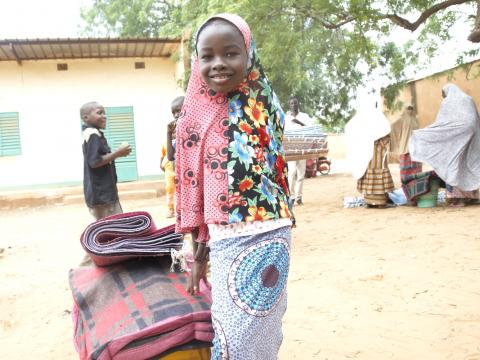Supporting sponsored children whose family houses have collapsed due to floods

Niger is a country known for its vulnerability to natural disasters such as floods during rainy season. Through its emergency interventions; World Vision support populations during these disasters; in order to reduce communities’ vulnerability.
Due to heavy rains in Niamey, the family houses of 14 children registered under World Vision’s sponsorship programme collapsed. After this incident, community volunteers responsible for registered children informed the organisation, prompting a visit to the field for an assessment, and support with emergency aid.
World Vision distributed Non-Food Items (NFI) worth 808,000 FCFA ($1,616) to affected families; with donated goods including 42 seater of mats, sheets, blankets, and treated mosquito nets; 28 buckets and plastic kettles; 14 25L jerry cans, and four children's potties.
Nine-year-old Inayatou and her family lost their home and currently live in a school. She narrates: "When our house collapsed , my mother, my little brother, my little sister and I lived in a school where we share a classroom with many other people. When it rains, it's cold all night. Thanks to the blankets that we received, my siblings and I will be able to cover and protect ourselves from the cold".
Persons in attendance at the donation were Government services from the commune, humanitarian affairs staff, community representatives including the president of the sponsorship committee, the district chief, the vice-president of the federation of saving group unions and the president of the child protection committee.
“We are pleased with the promptness with which World Vision responded to this incident. These donations represent an important help for these families” said Mrs. Ramatou, a community volunteer.
The affected families live in Talladjé 1 school while waiting for the end of the rainy season. Thus, the donations made will help them face seasonal interferences and protect children from mosquitoes and malaria.